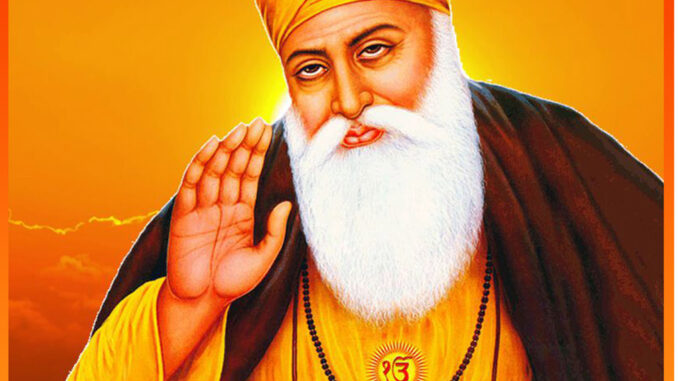

There is a striking verse in Sri Guru Granth Sahib (SGGS), the Sacred Sikh Scripture. Its author, Guru Nanak was the founder of Sikhi-sm:
ਗੁਰੂਸਮੁੰਦੁਨਦੀਸਭਿਸਿਖੀਨਾਤੈਜਿਤੁਵਡਿਆਈ॥– Guru Nanak Dev. SGGS, p. 150
Gurū samunḏ naḏī sabẖ sikẖī nāṯai jiṯ vadi▫ā▫ī.
Guru, the Divine Wisdom, is the bottomless Ocean, and all of its WISDOM is in the form of teachings from this Ocean. Those who take a dip in those achieve greatness.
Ocean and rivulets here are metaphors;an ocean for Guru’s Wisdom and rivulets for institutions of dissemination. The Ocean of sacred Knowledge is depthless. The water of Knowledge vaporizing from this Ocean creates clouds, raindrops, and snow. In turn, they descend on earth. Finally, they give birth to brooks, rivers, and sometimes, puddles all over the world. When they are in the format of shabad using the language of Sikh tradition, they are said to form rivulets of Wisdom.
Thus, the rivulets are metaphors describing the practices of the Guru’s teachings.
As rivulets vary in shape, size, speed, and quality of water they distribute, so are Guru Nanak’steachings. They adapt to numerous variations depending on the terrains of particular geographical or cultural expanses. Their shape and external formats are widely differing landscapes and linguistic temperaments. But their purpose is to nourish humanity with ONE Universal consciousness.
Guru’s Wisdom originating from Shabad Guru or the Wisdom imbibed in the Guru’s hymns(composed in 22 languages) applies to diverse populations and cultures. The recipients may be of various mindsets, varying from place to place. Guru Nanak’s Wisdom is applicable irrespective of religion, culture, or nationality.
Thus, Guru Nanak’s teachings would overtly look and feel diverse, but inside they are universal and carry the same fundamental doctrines and Wisdom. Their purpose is to nourish the human mind with one universal Knowledge towards ONE Universal Consciousness and ultimately take all humanity back to their source, the OCEAN, the Creator.
Cloud Burst
Sikh historian Bhai Santokh Singh reported a beautiful story from the Guruship of Guru Ram Das.
A delegation of religious scholars under the leadership of Pundit Mohan Lal came to visit the Guru. The members were well-known Pundits or leaders of Brahminical tradition. Their mission was to express their concern with the language and mode of propagation the Guru used to freely spread the Gurmat message among the people. The Guru rebuked the suggestion and used the same metaphor of rain as related above to make his point forcefully. Bhai Santokh described it as
Vedas and Puranas, the scriptures of ancient religions written in Sanskrit, are like water kept in a well. The divine message of Gurus’ hymns, the Guru said, waslike rain waters thatreach every thirsty person or every germinating plant.
Divine Knowledge in classical languages like Sanskrit or Arabic is like water kept in deep wells. It takes effort to draw it and then quench the thirst of the person drawing it out to irrigate crops of only those who possess the means of taking out water in this manner. No sharing was possible as the quantity thus drawn maybe sufficient only to satisfy the needs of the bucket holder.
In contrast, the Guru’s Wisdom must be in a language that served as a cloud burst. It turned the crops of everyone and in every field green; it reached mountains and valleys alike, birds and mammals alike, animals and humans alike, educated and uneducated alike, poor and rich. (See Santokh Singh, Sri Gur Partap Suraj Granth, Raas 1, Part 46, p. 1518. Reprinted Amritsar, Khalsa Samachar, 1954.)
The Guru’s verdict was akin to a biblical parabola.
Jesus is known to say that when you light a lamp, place it on a higher pedestal so that the light can reach everyone.
Diversity to be Welcome
The metaphor from the Guru Granth, as described above, also implied the appreciation of the great diversity observed in all civil societies and faiths. For example, As Guru Granth says, Diversity is Divine Order.
ਮੇਰੈਪ੍ਰਭਿਸਾਚੈਇਕੁਖੇਲੁਰਚਾਇਆ॥ਕੋਇਨਕਿਸਹੀਜੇਹਾਉਪਾਇਆ॥
My Timeless Creator has staged a play. He has created no one like anyone else.
Guru Amar Das, SGGS, p. 1056.
Without anappreciation of diversity, one fails to practice universality. Only diversity provides a necessary opportunity to practice universality.
Guru Nanak’s Religion Is Universal
The purpose of elucidating Guru Nanak’s metaphor above is to illustrate the universal nature of Guru’s message, Gurmat, or Sikhi.
What is universal? Universal applies universally, that is, for “all similarly situated individuals,” regardless of culture, race, gender, religion, nationality, sexuality, economic rank,or any other distinguishing feature.
There is a dynamic relationship between identity, community, and grace-awakened values, which are authentic when universal. Let us examine what exactly one means by “operationalizing Sikh universals.”
Let me begin by defining what is universal.
A universal is a concept, an idea, a feeling, etc.-across different cultures and languages. Its validity is beyond the domain in which it originated. For example, Christians have exported the idea of “God, or ‘religion’ beyond its origins in the Middle-Eastern and Greece-Roman context. Further, western secularists have exported the notions of democracy beyond its European and American context. Buddhists and Hindus have exported the concepts of dharma, karma, meditation, yoga, even Gandhi-ism, etc., beyond India. There are many more examples. But to take root in new soil, a concept must alter the relations between itself and other notions native to that new soil. To take root in a new ground is to transformconnections between the words and concepts of a new culture.
There is a firm conviction that Guru Nanak did not want his message confined to a narrow ethnic context. He traveled across cultures and religions. His teachings may have emerged within theNorth-West soil of India. Indeed, the teachings of every great spiritual master began their lives in a particular area.
But the message of Guru Nanak is such that all humanity shares it.
Guru Nanak himself traveled widely beyond his native place of birth, nearly 38 thousand kilometers. The universality of his teachings applied to many cultures across the areas of his visits. There was a purpose forthe Guru going much further than the borders of this lingua-franca. Guru Nanak’s teachings go well beyond the narrow meaning of ‘religion.’ It radically disrupts the Western religion-secular binary, on the one hand, to eliminate egoand, on the other hand, its intimate connection to the shabad as poetic consciousness.
In this way,SABD-guru may appeal to and be experienced beyond the Punjabi domain by all humanity because it also connects to shared humanity through our shared philosophy. The teachings of shabad-guruare both secular and religious. Thus, to operationalize shabad-guru is to release it from the traps of religious hegemony and allow it to create new relations with whatever soil it encounters and sets roots in. Thus, we see Guru Nanak’s mission as universal.
Conclusion
Several centuries ago, Guru Nanak used the Ocean metaphor for the divine Wisdom that serves humanity as the nourishing water of creeks all over the earth. Thus, Guru Nanak’s teachings would never formally alignwith one denomination, political party, geographical area, or ethnicity or allow someone to ignore laws of civil societies, sciences, or of colors and diversities of the same institutions. As far as we know, that was the intent of Guru Nanak.
Describing divine Wisdom as the Ocean of Truth and rivulets as routes of its dissemination Guru Nanak continued to tell all those who bathe in those rivers of Divine Wisdom will evolve to higher awareness.
ਨਾਨਕਸਾਹਿਬੁਮਨਿਵਸੈਸਚਾਨਾਵਣੁਹੋਇ
Says Nanak, an authentic cleansing bath, is experienced when the Divine dwells within human consciousness.
Guru Nanak, SGGS, p. 146
ਅੰਤਰਿਨਾਵਣੁਸਾਚੁਪਛਾਣੈ॥
One who takes an internal bath in Divine Wisdom comprehends the Truth.
Guru Nanak, SGGS, p. 414
Guru Nanak’s institutions and scholarship carry the responsibility to ‘operationalize and export’ the Wisdom to all civil societies. The specifics of ‘operationalization and exporting’ need extensive discussions. Here it suffices to conclude as follows. Don’t just be satisfied with the place on the library shelf provided for Guru Nanak’s teachings by the West. Similarly, don’t blindly worship it like a totemic object, as most Punjabis do. DO SOMETHING WITH IT. Do that which the Gurus wanted you to do with it. Experience it and be transformed by it. Those who bathe in those rivers of Divine Wisdom will evolve to higher awareness and recognition of the Divine within. Then, change the culture around you so others may seek Guru Nanak’s message.
(Author is a scholar of Sikhism and has authored hundreds of scholarly articles and written dozens of books. He can be reached at Japji2050@gmail.com)




Be the first to comment